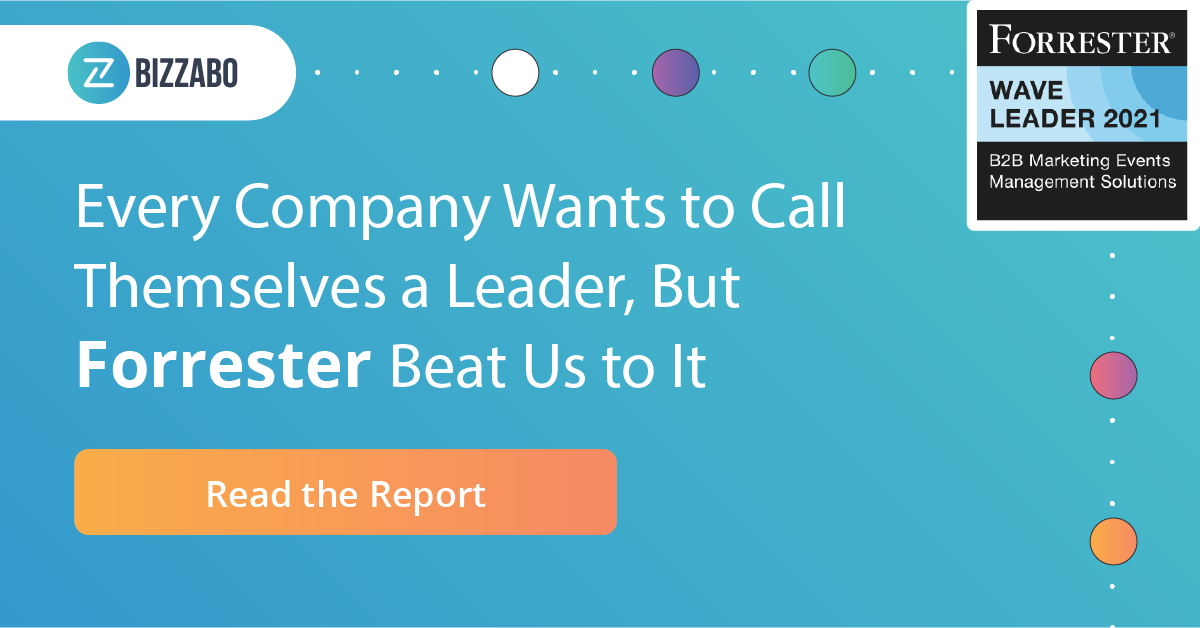The right event platforms can make or break your hybrid event. Learn what experts consider key for hybrid event platforms so you can choose the right fit.
As events move towards a hybrid future, choosing a hybrid events platform that provides your events team with everything you need to deliver successful in-person and virtual experiences will be a key decision. From the registration process to the event itself to the connection you maintain with your audience long after the event day, the right platform has the ability to win over audience members, sponsors, and clients alike—while also helping you and your team scale.
Industry experts predict that the future of events is hybrid. Meanwhile, over 70% of organizers plan on investing in hybrid events going into 2021, while only 24% of those organizers have experience in the hybrid realm. This is where collaborating with long-term, knowledgeable technology partners can save you time and money while providing your attendees and sponsors with the best possible outcome.
But what capabilities should a platform provide in order to create an experience that goes beyond simply virtual or in-person?
In this guide, we look at how a hybrid event platform can drive outcomes pre-event, mid-event, and post-event.
Pre-Event Hybrid Considerations
While so much preparation is focused on the event itself, everything leading up to the event is integral to driving registrations and sets the tone for the audience experience. “I always try to get people thinking about the audience journey,” says Dan Flynn, a Bizzabo manager and company veteran.
“The journey, up until the day of the event, is the same for both audience segments because it’s all digital,” he says. “If you’re looking for the best event solution, you need to have a platform that helps you not just with the day-of experience.”
A report exploring criteria for successful events management solution providers by leading global research and advisory firm Forrester Research agrees.
“To deliver virtual experiences that give remote attendees commensurate value to those participating in-person, top solutions are adding or upgrading digital attendee communications, registration and ticketing…”
—The Forrester Wave: B2B Marketing Events Management Solutions, Q1 2021
For this reason, the ideal hybrid events platform should drive the below outcomes:
- Creating a seamless attendee experience: It’s all about your attendees, so the capabilities of your events platform should reflect that. Everything from the attendee registration experience to the navigation of the event agenda and other relevant information to accessing virtual and on-demand content should flow naturally to make the experience truly seamless.
- Saving time for you and your team: A single event platform that can support aspects of virtual and hybrid events will allow you to centralize all of your actions and information and will give your team back some time. Functions like built-in event website builders that can clone and edit websites, the ability to sync information between a website and mobile app, portals for automating the process of managing speakers and partners, and a single agenda that can manage both virtual, in-person, and hybrid content—all help you get out of the weeds and focus on delivering an exceptional experience.
- Representing your brand to attendees, partners, and other stakeholders: From the moment a potential customer hears about your event, you have an opportunity to leave an impression. Email marketing tools built into event platforms, and beautifully designed templates allow your event to get started on the right foot, and consistently deliver your brand messages to customers.
For hybrid events, you will be catering to both virtual and in-person audiences. Since attendees are generally less committed to online events they register for, making a great first impression heightens your chances that your virtual audience will be excited to log on once the event begins.
Mid-Event Hybrid Considerations
After all the pre-work is complete, it’s time for the event itself. This is where the right platform can make a huge difference in the hybrid space. Since virtual and in-person audiences diverge at this point, the platform is the central location where the entire event comes together. “The platform is the event,” says Dan.
Because so much is riding on the platform, another key to selecting the right partner is to find one with a proven track record of security and stability. If the stream goes down during a true hybrid event, the in-person audience will be affected just as much as the virtual attendees. “If the experiences do get truly blended together, the platform needs to be incredibly stable,” says Dan. “So what someone looks for in a platform shouldn’t just be about all these cool, shiny exterior features—is its architecture good enough to be able to support your event?”
With networking and engagement being the biggest challenges in virtual events, a platform with interactive capabilities will provide a more interactive and fulfilling experience for your audience. The Forrester report found that to be true in its research:
“Vendors that can provide distinctive virtual experiences and audience/speaker engagement features that treat remote and physical participants equally position themselves to deliver content and value customers desire regardless of their location.”
—The Forrester Wave™: B2B Marketing Events Management Solutions, Q1 2021
Consider the following mid-event outcomes when choosing an events platform:
- Driving audience interaction: Hybrid events should provide both virtual and in-person attendees with the opportunity to participate in sessions should they so choose. The ability to launch a poll or survey and to field questions from in-person and virtual audiences are all table stakes for engaging a hybrid audience.
- Session accessibility: Whether your sessions are in-person, virtual, on-demand, or simulive they should be easily accessible by your attendees from a single event agenda. Your attendees should be able to start the day with a coffee and a virtual keynote at their desk, switch to a mobile viewing experience as they hitch a ride to the convention center, and then easily find the location of relevant sessions on the convention floor so that they don’t miss a beat.
- Creating a persistent community: Given the digital element of hybrid events, they live longer than just the event day itself. This means that your hybrid event platform should help you build an online community that can cater to attendees connecting in-person just as well as virtually.
- Production services: On their own, in-person and virtual events require the need of dedicated producers and tech specialists to assist with on-site check-in, recording sessions, and managing virtual streams. The vendor that you choose to power your hybrid event should be able to either provide production services directly or connect you to a services partner.
Post-Event Hybrid Considerations
Once the event is complete, the right platform can still continue to serve you. One of the ways that hybrid events are unique is that their life is more easily extended than a traditional in-person only event.
Because hybrid events by nature have a virtual component, now every session is automatically recorded and saved. Event organizers can use them to repurpose later, even making recordings available at a lower price point to maximize the investment in an event.
“This has been a huge boon for the events industry because you can collect leads and fill that funnel after the event happens,” says Dan. “So a platform also needs to help with that experience. Organizers are going to really need to pay attention to how they can make recorded content accessible to everyone after the event is done.”
Event analytics is another area where a platform can provide additional value to organizers and sponsors. Analyzing attendee activity may be easier when tracking virtual attendees, where you can track exactly how many interactions a sponsor has with your event audience.
When considering the analytics related outcomes of your event, consider the following:
- Surfacing Rich Event Insights: Insights are iterative. Once you have rich event insights to prove what works, you can put it into practice across the board and provide just what your customers and sponsors want from the beginning. Choose an event platform that will enable you to surface rich insights to see how attendees are participating in sessions and engaging with sponsors, check-ins, session attendance, length of participation (virtual), session ratings and feedback, mobile app usage, engagement with sponsors, and other event metrics.
- Unlocking Data to Prove ROI: With a platform that integrates with the rest of your marketing stack you’ll get more value from the data you’re collecting, and you’ll actually be able to use it to improve your marketing programs. You can ensure that your event activities are in sync with the business and that you’re delivering the value the business expects from you. And you’ll make it easier to prove the value of your event to your stakeholders. Look for a platform that can drive these outcomes through a customizable Open API that can be customized to your needs and native integrations to all major MAP and CRMs.
Additionally, a hybrid events platform that packages your content and data for you is simply taking work off your plate.
Takeaways for Choosing a Hybrid Events Platform
Once you find the right fit, choosing a long-term platform provider to partner with has many advantages. There are so many new components to this changing landscape, and because it’s their business, a platform partner is already thinking about how to evolve to the next level so they can bring those solutions to you.
One thing is for sure: “You’re going to want to manage before the event, during the event, and after the event seamlessly on one platform,” says Dan.
Here are some of the main takeaways to help you choose a hybrid events platform:
- Choose a platform that has everything you need from registration to analytics, that will be your audience’s touchpoint pre-event, mid-event, and post-event
- Consider a platform that gives you the tools to make a lasting impression on attendees and partners across the entire event journey
- Ensure the platform has interactive capabilities in order to connect the two audience segments together and increase engagement
- Check that your platform will provide both a way for you to accessibly host your content and a way for you to collect valuable analytics in every phase of your event
For more information on the solutions that are available to you, check out Forrester’s analysis of 14 of the top B2B marketing event management vendors.
Click here to see original post


